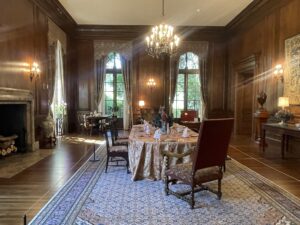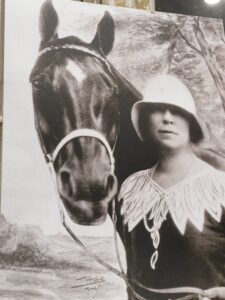From Sweden’s Poverty to a Life in Luxury
The majestic estate of Filoli, located just outside San Francisco, attracts hundreds of thousands of visitors each year. It provides insight into the life of Swedish-American heiress Lurline Matson Roth during several decades in the 1900s. The wealth originated from her father, William Matson, an orphan from Lysekil who built a fortune in the United States.

![]()
![]()
![]()
On December 31, 1936, the Swedish-American newspaper Vestkusten reported an extraordinary real estate transaction: “W.P. Roth, president of Matson Navigation, has acquired the palace-like property Filoli at Crystal Springs Lake for $225,000.” The reporter continued, stating that Mr. Roth is married to the late Swedish consul Matson’s daughter, Lurline. However, William Matson was not only an honorary consul but also the founder of the Matson shipping company, which the son-in-law took over after the patriarch’s death. Thanks to the inherited wealth, the Roth Matson family became one of the few potential buyers for Filoli, as many affluent families in the area had lost their fortunes during the depression a few years earlier.
In an interview later in life, Lurline Matson Roth recounted the details of the house purchase. Her husband had heard about the property being for sale, persuading his wife to attend a viewing despite her contentment with their residence in San Francisco and the summer house in nearby Woodside. “But I was immediately charmed by Filoli, who wouldn’t be?” she said. Lurline also mentioned in the interview that the deal happened swiftly, in less than a week, and shortly after, the family—comprising Lurline, Wilhelm, twin daughters Lurline (named after her mother) and Berenice, and son Wilhelm (named after his father)—moved into the grand estate.

Once settled at Filoli, the family became a focal point of San Francisco’s high society. When the twin daughters debuted in society, an extravagant and widely covered ball was held by the family at the estate. “The entire house was lit up, and we had live music, jazz, and festivities until four in the morning: it was a magical night,” one of the twin daughters revealed in an interview.
Before the party, the salons and halls were adorned with gigantic flower arrangements from the estate’s garden, including thousands of white lilies and blue irises explicitly cultivated for the special occasion. During the festivities, the daughters wore name tags adorned with diamonds, and the SF Chronicle reported that the girls were launched as grandly as the company’s elegant ships.
Lurline Matson Roth’s primary passion was horses, but she also firmly committed to Filoli’s gardens. She ordered seeds, kept meticulous records of everything she planted, and enriched the gardens with new plants.
At Sea as an Orphan at Ten
Lurline’s father, William Matson, born in 1849 in Swedish Lysekil, became an orphan early and went to sea at ten years old. After shuttling back and forth between New York several times, he ended up in San Francisco at 21. The Gold Rush was in full swing, and William saw opportunities. He stayed in the city and started a shipping company that transported goods such as sugar, pineapples, and eventually tourists between San Francisco and Hawaii: Matson Shipping. When the railway refused to transport oil to the ports, Matson built the first oil pipelines from their oil fields. The empire grew over the years and eventually included hotels in Hawaii.
The reputation of the successful Swede spread to Sweden, and one day, a letter from the foreign ministry asked William Matson if he would consider becoming an honorary consul for Sweden. Matson responded, expressing gratitude for the offer but explaining that he could no longer speak Swedish after his years in the USA. However, the language issue was resolved by Matson hiring a Swedish-speaking employee who translated when delegations from the homeland visited the city. Matson handled the task of representing Sweden excellently alongside his business ventures, and his daughter later recounted that the entire family was involved when visitors arrived.
William Matson died in 1917 as a dollar millionaire. He often talked about visiting his old homeland, but, according to his daughter, he initially had no time due to business, and then it became too late. However, after a visit, daughter Lurline Matson Roth declared, “Sweden is a very beautiful country.”
Donated Filoli to a Foundation
Today, Filoli is owned by a foundation, to which Lurline Matson Roth donated the property and a sum for maintenance in the mid-1970s after living alone as a widow on the estate for several years.
“Filoli is too beautiful to be private owned”, Lurline said in an interview.
Lurline passed away in 1985, but her daughter of the same name lectured for many years about life on the estate for Filoli’s visitors.
Nearly 400,000 people visit Filoli yearly to learn about bygone eras, explore the buildings, and enjoy the fantastic gardens that change with the seasons. The main building is over 5,500 square meters and has 56 rooms, including a ballroom, a reception room, a dining room, cozier family rooms, and servant quarters. In the Gentleman’s Orchard, more than 400 varieties of apples, pears, and grapes thrive, along with many unusual fruits such as Japanese medlar, quince, and hawthorn. In the English Rose Garden, roses of all imaginable colors and sizes grow planned for continuous blooming. The Sunken Garden is like its own room with an elegant pool, and the estate also features a well-sized kitchen garden.
Writer: Margaretha Levander
![]()



